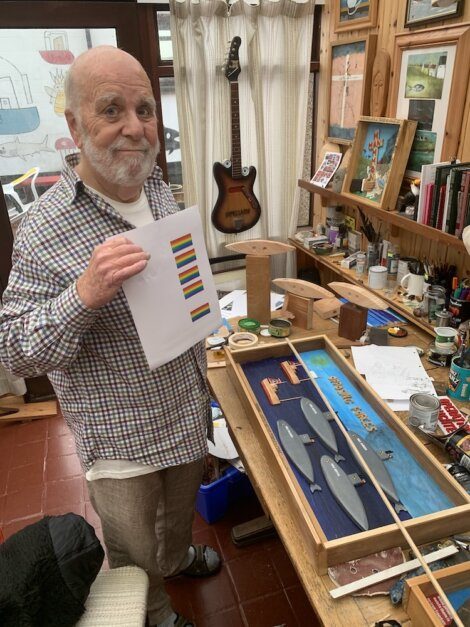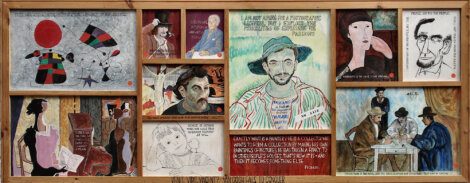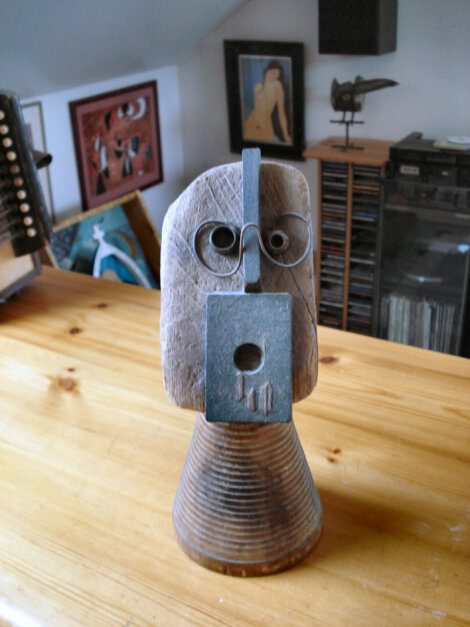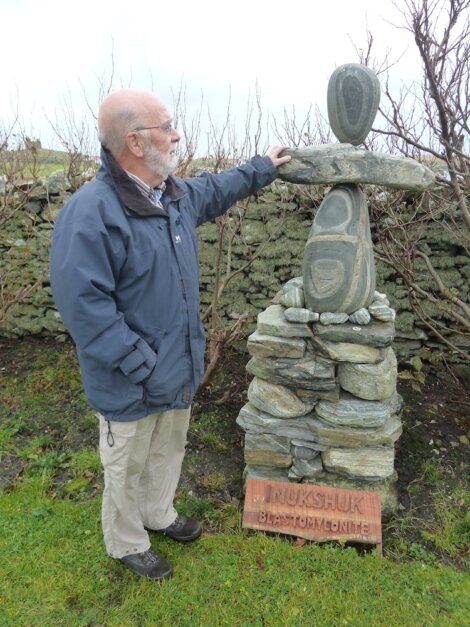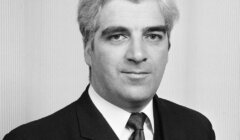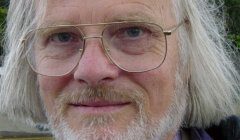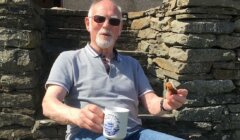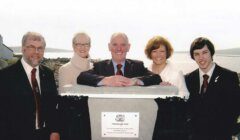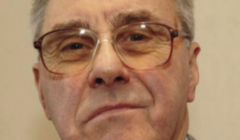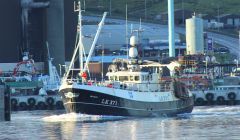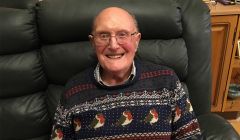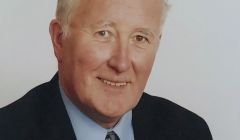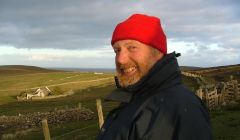Tributes / Dr Mike McDonnell obituary: ‘An extraordinary man who always used his many talents for the public good’
GENERAL practitioner, malariologist, ethnologist, kayaker, pirate, musician, artist, writer, craftsman, local historian, house builder, scholar, community activist and storyteller extraordinaire… Mike McDonnell was all these things and more. Polymath is probably the right word, although he would have scoffed at that. He was also a devoted husband, father, grandfather and great-grandfather, a man who lived his life to overflowing and who loved enriching the lives of his family, friends, neighbours and patients.
Born in Greenock in 1939, he was a contemporary of other celebrated Greenock loons such as Richard Wilson, Ron Sandford, Bill Bryden and Malky McCoig. His father, Bill McDonnell, was a secondary school Maths teacher and part-time scriptwriter, who wrote for Glasgow show business stars and for the forces Entertainments National Service Association (ENSA), entertaining the troops during World War 2. After their father died intestate of a cerebral haemorrhage at the age of 48, Mike, his brother John, sisters Bessie and Viki and their mother, Molly, knew sad times and hard times.
On his mother’s side Mike came from a long line of master mariners (one of whom had once been wrecked in Shetland). By the time he enrolled as a medical student at Glasgow University he was already exploring the Clyde estuary in a kayak and being a bit of a nuisance as a protestor to the American nuclear submarine base in the Holy Loch, bravely facing being ferociously hosed down by the submariners. Mike and his mates often took to the water late at night, after a ‘jar’, as their kayaks were (too) conveniently laid up close to their ‘local’. One episode led to a charge of piracy after they decide to board and check out a yacht moored close by, a hilarious tale that he loved to tell, over and over again. Yes, Mike did repeat his stories, but they were legion, they were hugely entertaining and most of them bore repetition.
Become a member of Shetland News
Although an assiduous and talented student, Mike’s extra-curricular activities at university also brought him to the attention of the authorities. On one occasion he was expelled from the students’ union after riding a bike through a hall he was decorating for the charities ball. The bike knocked the future First Minister of Scotland, Donald Dewar, off a ladder and there was hell to pay. Mike said the upside was that, no longer being a member of the union, it was quite in order for him to be paid for his artistic endeavours in the hall, and he was.
His reputation as a bit of a wild man had preceded him when he asked a beautiful nurse from Carlisle for a date, repeatedly, showering her with flowers – which she clocked he acquired from the hospital gardens. Gill Pickering had her doubts but from the moment he set eyes on her Mike had none. She relented, in part fearful the gardener might impale him, while impressed and touched by his persistence. He then persuaded her to marry him and, after he’d done a course in tropical medicine at Liverpool, in 1966 they set off for a British colony in the South Pacific where, in due course, their sons Peter, and later Iain, were born.
As a junior medical officer in the Solomon Islands he had the good fortune to come under the wing of a wise and kindly superior, Dr Jimmy McGregor (who later became, by coincidence, Shetland’s Medical Officer of Health). Dr McGregor soon came to value his hard-working new recruit, even if his principled enthusiasm sometimes led him into conflict with Christian missionaries and, more seriously, with traditional shamans and healers – pioneering anti-vaxers who did not always take kindly to competition from the government’s malaria eradication campaign and sometimes objected to islanders being jabbed. One of the shamans was so incensed, when the young doctor tried and failed to save a boy who had been fatally injured in an accident, that he put a curse on Mike and took out a contract on him. Fortunately the hitman was intercepted by protective staff at the medical centre in Honiara while Mike was enjoying a beer in the social club after work, quite unaware of his mortal danger.
Mike revelled in his visits to hold clinics in the outer islands, travelling with the District Commissioner’s small motor vessel and landing on beaches in outrigger canoes. In addition to the medical challenges he was fascinated by the traditional culture of the Solomons, particularly the decorative arts, boatbuilding and the music of drums and bamboo pipes. He learned the local ‘pidgin’ dialect and his friends included the hospital orderly Solomon Dakai, with whose band he often strummed along on the guitar. A favourite song was ‘Time you go, long way long sea. Me sorry long time long you.”
With Gill having gone ahead, pregnant with Katie, in 1971 Mike returned to Greenock, where he became a partner in a medical practice. Mike’s method was to be on familiar terms with his patients and also to investigate the poor diets, lifestyles and housing that often lay behind their ill health. This led him into areas of the town where even the police were reluctant to venture after dark. He took up the case of a patient whom the council had evicted from a derelict building. He won but he was unsettled with working life in the urban setting of Greenock, “a town of two halves”, and soon he was looking for another job, having decided he was a “medical misfit”.
With his experience in doctoring remote islands, he applied for the single-handed Yell and Fetlar practice and was appointed in 1973. He would work there for 25 years, during which he and Gill brought up a family of four, with Jubilee baby Jenny arriving in 1977, and had a profound influence on their fellow islanders’ lives, particularly in the Isleshaven continuing care centre, the first of its kind. Working with the local district nurses and with Peter Malcolmson, Gussie Angus and Al Williamson from the council’s Social Work Department, Mike had noticed that elderly islanders tended to become stranded in the Lerwick hospitals after treatment. Isleshaven meant they could convalesce nearer home and family and, if necessary, be cared for long-term in their community. It also reduced the ‘bed-blocking’ problem at the Gilbert Bain Hospital. Setting up, arranging finance for and running Isleshaven involved numerous struggles with bureaucratic ‘silos’, battles in which Mike’s blunt and humorous charm usually won the day.
Although there were no competing medicine men like those he’d encountered in the Solomons, Mike’s new post was not without its dangers. In the days before car ferries, he relied on boatmen Douglas Brown and Bobby Tulloch to take him safely from Mid Yell to Fetlar for his Friday clinics and for emergency calls, whatever the weather. There were some “fairly hairy” trips, he recalled. On one wild day the doctor and his bag had to be landed on slippery rocks as the pier could not be reached in the gale.
If a single-handed GP wanted a holiday he or she had to pay for a locum to cover for them. Mike firmly believed that all the staff of the NHS should be salaried and that GPs’ self-employed status was an anomaly. Always a fierce defender of Nye Bevan’s founding principles when the NHS started in 1948, he made his views plain on this and other contentious issues in some lively articles for the magazine World Medicine and in his role as Shetland’s representative on the British Medical Association. This got up the noses of some of the stuffy old shirts in the medical establishment at BMA meetings in Edinburgh and London but Mike never minded doing that if the cause was just.
There was more wrestling with bureaucracy when Mike persuaded Shetland Health Board to make Yell and Fetlar into a training ground for recently qualified medical students who’d chosen to work in rural general practice – which, then as now, had a recruitment problem partly caused by the better money to be made in more specialised fields of medicine. The project was a great success and over the years trained many GPs, including several, such as Dr Helen Ward, who stayed in Shetland for most of their careers.
The young doctors were treated as part of the McDonnell family at their hospitable home in Hillend, Mid Yell, and later at the Old School across the voe in Camb, which Mike and Gill converted into a lovely home, complete with workshops and a wonderful library that reflected Mike’s vast range of medical, artistic, literary and ethnographical interests. Unexpected visitors were always welcome, particularly if they could sing or play a musical instrument, but meals were often interrupted by an emergency call and off Mike would go, never knowing when he might be back to finish his dinner.
The workload was massive but Mike made himself useful to his adopted community in more ways than merely medical. Soon after he arrived in Mid Yell he became involved in the controversy over a proposed oilfield supply base at Basta Voe. At public meetings and in letters to the press he made an articulate case for Yell to share in the local job opportunities that oil brought, rather than just becoming a commuter island for Sullom Voe (which is what happened). Later, as secretary of the Yell Ferry Users’ Association, he was a vocal advocate for a better ferry service as a way of stemming the depopulation of the North Isles. He was a stalwart organiser and could always be relied upon to volunteer (or sometimes to ‘be volunteered’) for time-consuming letter-writing, research and committee sittings in aid of community causes. For example, he was a driving force behind the Second Yell Conference in 1998, held to promote the island’s employment potential in fishing, aquaculture, agriculture and tourism, and again to highlight the looming depopulation crisis.
As he had in the Solomons, Mike was quick to recognise and appreciate the traditional wisdom and skills of his fellow islanders. He was an evangelist for art and encouraged many local artists such as the late Jeanette ‘Peanuts’ Novak and craft workers such as Hamish Polson. In what little spare time he had, he organised classes for the Open College of the Arts. He called it “The Forgers’ Studio” and with his fellow students produced some superb reproductions in the styles of Picasso, Matisse, Van Gogh, Gauguin and other famous painters – on the principle that by copying something you learn how it was done. The ‘forgeries’ found a ready market.
Artists need galleries so Mike arranged that as well. In the semi-derelict Old Ha’ of Burravoe he saw an opportunity to create a local museum, heritage centre and gallery. It took years of grant applications, form-filling, letter-writing, phone calls, meetings and campaigning with many hurdles along the way (bureaucracy again, not least the planning regulations) but the wonderful community resource centre that Mike and his team of fellow enthusiasts created in 1984 is a lasting and magnificent achievement. It would not have happened without him.
Mike was always up for a laugh. In 1995 this led him, dressed as Bugs Bunny, to paddle a home-made pedalo across Bluemull Sound with Robbie Williamson (‘Robbie o’ Camb’) wearing a clown’s outfit. The stunt raised hundreds of pounds for a local nursery and after disembarking from the rickety craft Mike told waiting reporters: “The only time I got wet was when we reached the shore and one of my patients sprayed me with champagne”.
When a friend from Greenock schooldays, the artist Ron Sandford, got in touch, saying he’d tired of city life in Hong Kong and London and ideally would like to live in a house on an island with a good view of the sea, a trout loch, a shop nearby and a bus service, Mike had the instant solution – there was a property on the market in Cullivoe that ticked all these boxes, with a nearby building for a studio as well. Ron and his wife, the book illustrator Mei Lo So, moved north and continued their prolific artistic work in a community that took them and their daughter Ming to their hearts. Mike was absolutely delighted.
Life in the McDonnell household could be noisy and chaotic but it was always a place of love and laughter. Not surprisingly, the four bairns grew up to be a credit to their parents: Peter became a social worker, Katie a physiotherapist, Iain a trawler/workboat skipper, Jenny an engineer; they and all their children were a source of pride and joy. Family holidays sometimes involved a cramped journey in a camper van to a French campsite. Nearer home, there were weekend kayak expeditions to Hascosay, where Mike once organised a spectacular treasure hunt for bairns and where his teenagers were involved in the celebrated Hascosay rock festival. There were longer expeditions by kayak, circumnavigating Fetlar with his friend the teacher Brian Watson (during which they had to rescue their rescue boat) and on one famously sunny day Mike paddled solo right around Yell: “It was such a fine day that I just kept going,” he said.
After retiring from the Yell and Fetlar practice he did not immediately hang up his stethoscope but did locums for other GPs. This ended in an extremely distressing experience. While working in Inverary he was called to the scene of an horrific murder and had to be a witness in the subsequent court case. After that, enough was enough and in the year 2000 he left medicine after a career of 35 years.
There was no thought of putting his feet up, for Mike immediately plunged into a career as an artist. Over the years he had developed an interest in creating pictures/sculptures from pieces of driftwood and bric-a-brac. Now he had time to indulge his passion for art. Besides, as he said, no-one would have wanted him as a locum doctor in Yell after his former patients had seen him in a dirty boilersuit, clambering into rubbish skips to retrieve objets trouvés for his next artistic oeuvre. Over the next decade he created dozens of works and began to attract critical attention. He won a commission for the bronze bas-relief sculpture at the entrance to the new Shetland Museum, unveiled by the Queen of Norway in 2007. He also illustrated a book by Andrew Greig, ‘Found at Sea’, and created stage sets for the subsequent play. Gill was his constant supporter and always a humorous critic. Retirement brought them contentment and more time to enjoy family life.
Gill’s death from cancer in September 2011 was a dreadful blow. Although surrounded by caring family, friends and neighbours, Mike was stunned by grief. Encouraged by Ron Sandford and the gallery owner Dorota Rychlik, over the next few years ‘Doctor Mike’ coped with his bereavement by creating hundreds of art works, with exhibitions at his hometown of Greenock, Vaila Fine Art, Catterline near Stonehaven and the Ceilidh Place in Ullapool where the owner, Jean Urquhart, became a firm friend and promoter. His work was in demand and the proceeds latterly went to charity, often to relieve the suffering of refugees.
Many of the pieces referred to his favourite poet, W. S. Graham, a fellow Greenockian, and to the eccentric St Ives painter Alfred Wallis, in whom he had a special interest. Inscribed on his home-made timber frames there were often incisive political comments in his unique calligraphic style and, of course, Mike could never resist a good pun (or a bad one). A special interest was the art of schoolchildren. He regarded the average five-year-old’s talent as far superior to his own and his speciality was using a jig saw to make three-dimensional wooden versions of the bairns’ drawings and paintings.
In a brilliant collaboration with the Shetland Geopark and Burravoe Primary School he helped the pupils to create an open-air gallery of ‘Inukshuk’ statues in the Burravoe Old Ha’ garden – made from Yell’s various ancient rocks and based on Inuit footpath waymarkers from Baffin Island.
He was joint editor and a contributor to Bobby the Birdman, a biography of Bobby Tulloch, published by Birlinn in 2016. Somehow he also found time to help his old friend the late Wibby Clark, a fine boat builder and joiner, working alongside him at Mid Yell. Other projects included being a founder member of the Yell Shanty Men male voice choir, which took Mike and his friends to sing at events around Shetland, in the Netherlands, Ireland and elsewhere. Next was his involvement in the Men’s Shed movement. Although he had a well-equipped workshop and several sheds himself, he knew there were other men who would love to work with their hands if only they had the gear and the premises. Like art, woodwork and craftwork were seen as promoting fellowship and mental health, particularly for lonely and bereaved folk. With assistance from Graham Stiles of Ulsta he secured premises in the former Mid Yell School. Thanks to a handsome donation from the Co-op, for purchasing tools and equipment, the Men’s Shed was nearly ready for use when Mike died on 26 January, from complications after an urgently needed heart operation.
As a doctor, he was fully aware of the risks of such a procedure for an 82-year-old patient with several other health problems. He was optimistic to the end but he took the precaution of putting his affairs in order before he left home for the last time shortly after New Year, to stay with his daughter Jenny in Banchory while waiting to go to hospital in Aberdeen.
The week before his death he was still working on his memoirs from that five-year stint in the Solomons at the start of his career. The working title was ‘Where Extremes Met’ and from the initial drafts it promised to be a work of great interest, style and humour. Hopefully he wrote enough for it to be published posthumously. He was also planning more art works, according to a list found among his effects. One of the last pieces he completed was a startling painting on five panels from the back of an old piano. In Memory of Fawad Andarabi is an outraged protest at the Taliban’s summary execution of an Afghani musician and folk singer last year, for the crime of entertaining people.
Dr Mike McDonnell was an extraordinary man who in his professional and personal life always used his many talents for the public good. He will be greatly mourned by all who knew him. We shall not see his like again and now someone else will have to tell his stories.
“We sorry long time long you.”
Dr Mike McDonnell, born 4 June 1939, died 26 January 2022. Dr McDonnell’s funeral will take place on Wednesday 9 February at 12.00 noon at Mid Yell Public Hall.
Contributed
Become a member of Shetland News
Shetland News is asking its many readers to consider paying for membership to get additional features and services: -
- Remove non-local ads;
- Bookmark posts to read later;
- Exclusive curated weekly newsletter;
- Hide membership messages;
- Comments open for discussion.
If you appreciate what we do and feel strongly about impartial local journalism, then please become a member of Shetland News by either making a single payment, or setting up a monthly, quarterly or yearly subscription.

































